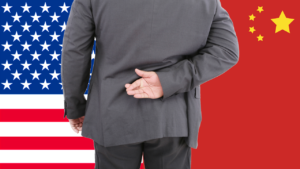In a move reminiscent of the Cold War, the Pentagon has announced plans to establish a crisis hotline between Washington and Beijing [“U.S., China Aim to Mend Ties,” by Walter Pincus, Washington Post, 14 June 2007].
“A Pentagon official … cited plans to establish a crisis hotline between Washington and Beijing as well as expanded exchanges involving top U.S. and Chinese defense officials as signs of improving U.S.-Chinese military ties. ‘We believe these exchanges and mechanisms have the potential to improve mutual understanding, reduce miscalculation, and contribute over time to “demystifying” one another,’ Deputy Undersecretary of Defense Richard P. Lawless said at a hearing before the House Armed Services Committee.”
The hotline seems a bit anachronistic (I wonder if it will be a red phone like the famous line that connected the Kremlin and the White House). The original hotline was established to prevent global thermonuclear war in an era when communications between the two opposing blocs was rare. That really isn’t the case today between the U.S. and China. Economic ties between the U.S. and the Soviet Union were virtually non-existent when the first hotline was established whereas economic ties between the U.S. and China are strong. Nevertheless, symbolically the hotline is important. We don’t have to look back too far to realize that serious misunderstandings can take place even between strong trading partners. I’m referring, of course, to the Chinese shoot-down of a U.S. Navy patrol plane in 2001.
“From a low point in April 2001 — when military contact was all but cut off after Chinese aircraft forced down a U.S. Navy EP-3 spy plane over the South China Sea and held its 24-member crew for 11 days — the U.S. relationship with Beijing ‘has grown increasingly important and complex,’ Lawless said.”
Much more important than the announced hotline are the “expanded exchanges involving top U.S. and Chinese defense officials.” These were activities sorely missing during the Cold War. As a result, a certain paranoia was created between the U.S. and Soviet (now-Russian) military officers that persists even to this day, especially in Russia. Open and honest exchanges, even cooperation, are a much better path to “peaceful coexistence” (to resurrect an old Cold War term) than brinksmanship, secrecy, and mistrust.
“[Lawless’] testimony illustrated that point [i.e., the important and complex relationship between the U.S. and China] by detailing favorable developments such as naval ship visits, military academy exchanges and bilateral search-and-rescue efforts, as well as more troubling ones, including Beijing’s ‘ambitious and long-term military modernization program,’ which is ‘expanding from traditional land, sea and air dimensions of the modern battlefield to include space and cyberspace.’ Lawless said that Chinese authorities are ready to move on a telephone link to enable senior-level conversations in the event of a defense crisis. However, he added that China’s ‘counter-space efforts — which we witnessed during the January 2007 direct ascent anti-satellite test — will enable Beijing to hold at risk the assets of all space-faring nations.'”
Pincus goes on to note that many in Washington continue to question China’s military build-up and its intentions, even though they claim to believe that China need not become an enemy. Keeping doors open and information flowing is the best way to ensure that misunderstandings are kept to a minimum and that dialog remains more important than confrontation. The Economist editorializes that caution is certainly warranted, but that outright China bashing is a bad idea [“America’s Fear of China,” 19 May 2007].
“The itch to get tough with Beijing is urgent in Congress. Brandishing China’s growing bilateral trade surplus as proof, congressmen from both parties have denounced the country as a currency manipulator, an illegal export-subsidiser, a violator of rights to intellectual property and all-round trade scoff-law. China-bashers have introduced a dozen bills in the new Congress. Some are bound to languish, but others may be passed—though there would then be further hurdles to jump, not least the president’s power of veto (George Bush has other conflicts on his mind). The most threatening include proposals that would declare China’s cheap currency an illegal subsidy and allow American firms to seek compensatory tariffs. Politics in Beijing is less open, but the circumstances are similarly unhelpful. Because they have no electoral legitimacy, China’s Communist leaders need to deliver the economic goods even more than most congressmen do. Worried about unemployment, the Chinese are loth to let their currency, the yuan, appreciate much faster than at today’s snail’s pace. And as with all dictatorships, there is the need to seem tough. With the five-yearly Communist Party congress only months away, China’s president, Hu Jintao, cannot be seen to be bowing to American pressure on the yuan or anything else.”
The reason that The Economist believes China bashing is a bad idea is because the U.S. has much to gain from improved relations and bashing could prove to be a self-fulfilling prophecy.
“China is already America’s fastest-growing export market. … But logic, alas, may count for less than political grievance. America’s low unemployment rate looks set to rise in the wake of the housing bust. To American voters, the Chinese are likely to become more prominent rivals, whether it be displacing America at the top of some economic league tables, winning Olympic medals or buying big American firms (the Chinese are rightly keen to diversify from treasury bonds). Most worrying, though, are the strategic risks. … China is potentially a military competitor. Trade tensions could make it easier to see China as a rival and harder to enlist it as a partner.”
The article concludes that America has much to lose but little to gain from bashing and much to gain and little to lose from cooperation.
“Rather than picking fights over the currency, Congress should step back and ask why Americans are so upset with China in the first place. The answer is that China is a scapegoat for broader economic anxieties to do with stagnant wages, rising income-inequality and dwindling health and pension benefits. … Raising barriers to cheap Chinese imports would disproportionately hit the wallets of poor and middle-income American consumers—the very people the Democrats in particular claim to be protecting. By scaling back its China-bashing, Congress could avoid such blunders. It would also leave more room to engage Chinese officials on subjects that actually matter. … The greatest prizes of Sino-American diplomacy are nothing to do with trade. Avoiding war and conflict, naturally, comes top of the list, whether by co-operation over North Korean and Iranian nukes or by building the trust that minimises the odds of a clash in the Taiwan Strait. Then there is China’s expansion into Africa, particularly its cosy relations with genocidal Sudan. Global warming, too, ought to be centre-stage. China is building a new coal-fired power plant every week and is set to surpass America as the biggest source of greenhouse gases within a year. If the world is to contain its carbon emissions, America must not only clean up its own act but also help China to green its economic growth.”
The Pentagon and The Economist agree that strengthening ties and keeping lines of communication open are in the best interests of both the United States and China.




